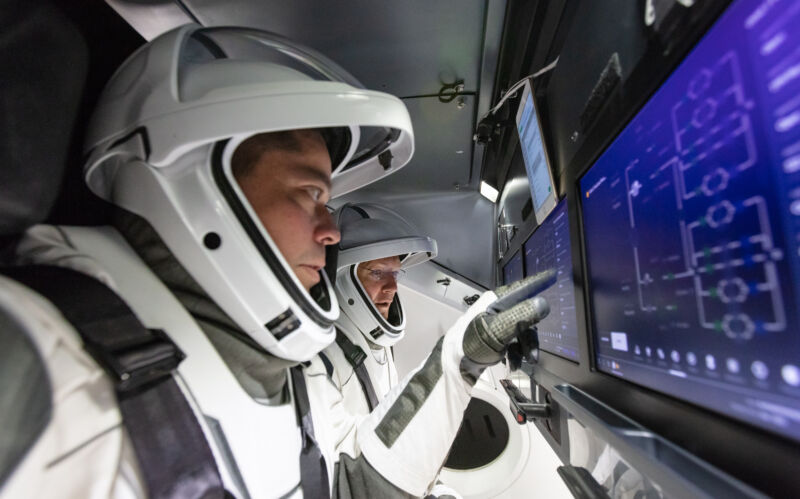
Vice President Kamala Harris on Tuesday will bestow the Congressional Space Medal of Honor on Doug Hurley and Robert Behnken. The former NASA astronauts launched on the debut flight of SpaceX's Crew Dragon spacecraft in May 2020.
Hurley, the spacecraft commander, and Behnken, its pilot, will receive the medal for "bravery" exhibited during the Demo-2 mission to the International Space Station. Their debut mission was a complete success, and since this pioneering flight, NASA has flown five operational missions on board Crew Dragon, along with two private spaceflights.
An operational Crew Dragon has provided NASA with its sole means of reaching the space station aside from the Russian Soyuz vehicle—saving the space agency from the embarrassment of relying on Russia for this transport amid escalating tensions surrounding the war in Ukraine.
Outside of space circles, the space medal is not a particularly well-known honor, especially because it has not been awarded in nearly two decades. However, the medal is prestigious and often only given to astronauts who have died during spaceflight activities.
Over the course of more than four decades, the Congressional Space Medal of Honor has only been awarded to 28 astronauts, ever. Of those, 17 were given posthumously to the crews of the Apollo 1, Challenger, and Columbia accidents.
The US Congress authorized the president to award the medal "to any astronaut who in the performance of his duties has distinguished himself by exceptionally meritorious efforts and contributions to the welfare of the Nation and of mankind."
President Jimmy Carter bestowed the first awards on Apollo astronauts Neil Armstrong, Frank Borman, Pete Conrad; Gemini's Gus Grissom; and Mercury's Alan Shepard and John Glenn in 1978. When not awarded posthumously, the award has gone to pioneers, such as Shannon Lucid, who conducted a long-duration spaceflight on the Mir space station, or astronauts who have flown first on new vehicles, such as John Young and Robert Crippen on the space shuttle.
Within the next two years, additional astronauts will pioneer new spacecraft and may become eligible for the medal.
Later this spring, as soon as April, Butch Wilmore and Suni Williams will make the debut crewed launch on Boeing's Starliner spacecraft to the space station. Then, perhaps in late 2024 or early 2025, four astronauts will fly on board NASA's Orion spacecraft around the Moon. These four crew members for the Artemis II mission, expected to include a Canadian astronaut, are likely to be named sometime this spring.
reader comments
70